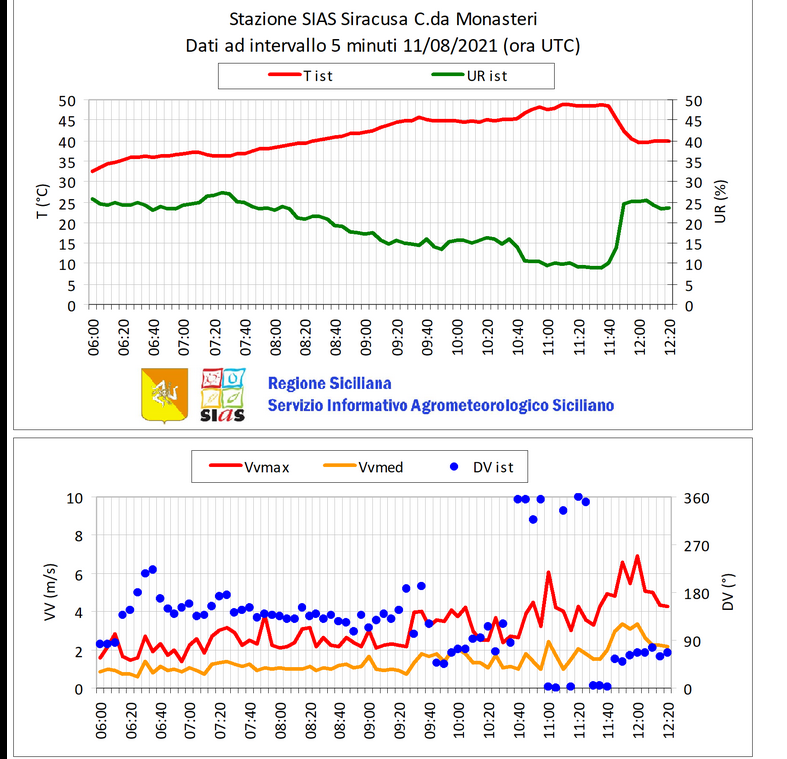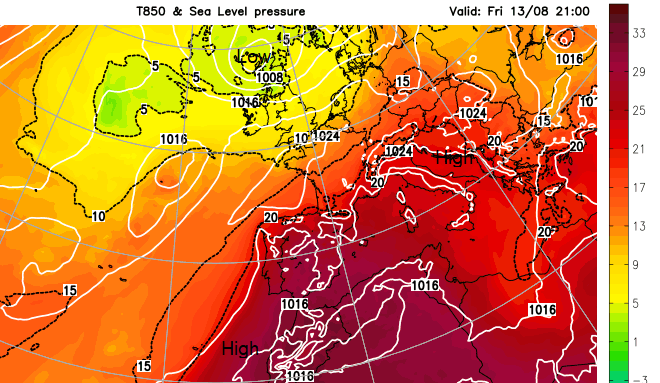
Siracusa province, Sicily recorded 48.8C on 11th Aug 2021. Possibly a new European high, if verified by the WMO. Greece with 48.0C July 1977 is still the official record. Heat warnings and wildfires continue.
Wednesday 11th August 2021 saw (provisionally) the highest European temperature ever recorded. Siracusa province in SE Sicily, Italy recorded 48.8C at 13:14 local time before a sea breeze set in around 13:40. The Servizio Informativo Agrometeorologico Siciliano (SIAS) has confirmed the observation from the Monasteri station which was installed in 2002. However, there are strict conditions for weather observations Checks are needed before it becomes an official record but meanwhile the warnings and wildfires continue in southern Europe.

This could be Italy’s highest ever temperature and would beat the official highest European temperature of 48.0C from Greece back in July 1977. There have been other 48C+ temperatures from Sicily but they have not been officially stamped by the WMO (World Meteorological Organisation).
This observation will undergo that same process, but it all takes time. Whatever the result, this month has seen horrendous summer conditions for southern Italy, Greece, Turkey and now the north Algerian coast. Extreme heat and ongoing dry weather. Intense wildfires with evacuations and deaths. There is smoke in the air, dust plumes too and the hot, dry conditions continue with an extension westward over Sardinia, Corsica and into Spain. Temperatures for mainland Spain are forecast to move into the 40s Celsius. Spain has seen over 47C recorded before, including the summer of many heatwaves across southern Europe, 2017. The August 2017 heatwave was known as Lucifer and thousands of people died.

With high pressure over the central Mediterranean, hot air has been pulled up from Africa. This high edges slightly westwards, centred over Algeria and the feed of hotter air begins to reach up through Spain once more. Sicily will see another hot day on Thursday, with a red warning for Sardinia and from AEMET for NW inland Spain. As the wildfires continue to rage for the Greek Islands and Turkey, an unusual low pressure has formed over the Black Sea. A cyclone with tropical characteristics is bringing torrential thundery rain to northern Turkey and is forecast to continue in the region until the weekend. Possibly heading towards south coast Ukraine or Russia.

In this week when the IPCC issued their Climate report ‘Summary for Policymakers’ as part of AR6 (Sixth Assessment Report), from Working Group One
The Current State of the Climate - It is unequivocal that human influence has warmed the atmosphere, ocean and land…Human-induced climate change is already affecting many weather and climate extremes in every region across the globe.
Whilst this observation may turn out not to be a new European temperature record and individual events need investigation and research to see if there are links to the warming climate, we are now in a world where heatwaves are more likely and will be more extreme.
Extreme Heat then creates and heightens drought and conditions where wildfires are likely. The heat island effect becomes more pronounced and increases demands on energy. Extreme heat is one of the main causes of weather related deaths.
Future planning can address how to live with the heatwave events, as the IPCC reports and COP26 continue to emphasise global heating and impacts of climate change. Planning projects such as Health advice and heat preparedness. Green planning for cities with shaded areas, more trees, cool roofs and green corridors. North America utilised cooling centres earlier this year and the UK Met Office issued its first set of Extreme Heat warnings this summer.
Professor Peter Stott has studied European heatwaves and is the Met Office’s lead on climate attribution- studying the links of extreme weather to climate variability and change.
He said: “Climate change is making heat-related extremes of weather more intense and when we think about those record-breaking temperatures the chance of breaking temperature records – or coming close to breaking records – is greatly increased."
“Record-breaking temperatures in June 2019 saw the French temperature record exceed 45.0°C for the first time, and our analysis found that event was five times more likely because of climate change. Although we haven’t yet been able to run an in-depth study on the current situation (August 2021 southern Europe heatwave), I think it’s going to be clear that climate change has made this current event more extreme."
Europe might pass the 50C mark, the UK might pass 40C. Regions close to the Mediterranean in southern Europe can be blasted by very hot air from North Africa which is what has happened this week. When that air manages to pull right up through Spain and France, it drys further, continues to be heated by the sun as it moves over the warm land and then can reach the UK. Our record is 38.7C, from July 2019 at Cambridge Botanic Gardens. Can't imagine what over 48C feels like.